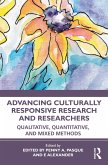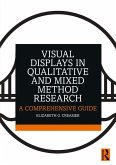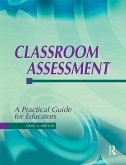Advancing Culturally Responsive Research and Researchers (eBook, PDF)
Qualitative, Quantitative, and Mixed Methods
Redaktion: Pasque, Penny A.; Alexander, E.
38,95 €
38,95 €
inkl. MwSt.
Sofort per Download lieferbar

19 °P sammeln
38,95 €
Als Download kaufen

38,95 €
inkl. MwSt.
Sofort per Download lieferbar

19 °P sammeln
Jetzt verschenken
Alle Infos zum eBook verschenken
38,95 €
inkl. MwSt.
Sofort per Download lieferbar
Alle Infos zum eBook verschenken

19 °P sammeln
Advancing Culturally Responsive Research and Researchers (eBook, PDF)
Qualitative, Quantitative, and Mixed Methods
Redaktion: Pasque, Penny A.; Alexander, E.
- Format: PDF
- Merkliste
- Auf die Merkliste
- Bewerten Bewerten
- Teilen
- Produkt teilen
- Produkterinnerung
- Produkterinnerung

Bitte loggen Sie sich zunächst in Ihr Kundenkonto ein oder registrieren Sie sich bei
bücher.de, um das eBook-Abo tolino select nutzen zu können.
Hier können Sie sich einloggen
Hier können Sie sich einloggen
Sie sind bereits eingeloggt. Klicken Sie auf 2. tolino select Abo, um fortzufahren.

Bitte loggen Sie sich zunächst in Ihr Kundenkonto ein oder registrieren Sie sich bei bücher.de, um das eBook-Abo tolino select nutzen zu können.
Advancing Culturally Responsive Research and Researchers: Qualitative, Quantitative and Mixed Methods encourages readers to design and engage in methodologies and methods that place cultural relevancy at the center of inquiry.
- Geräte: PC
- ohne Kopierschutz
- eBook Hilfe
- Größe: 15.69MB
Andere Kunden interessierten sich auch für
![Advancing Culturally Responsive Research and Researchers (eBook, ePUB) Advancing Culturally Responsive Research and Researchers (eBook, ePUB)]() Advancing Culturally Responsive Research and Researchers (eBook, ePUB)38,95 €
Advancing Culturally Responsive Research and Researchers (eBook, ePUB)38,95 €![Visual Displays in Qualitative and Mixed Method Research (eBook, PDF) Visual Displays in Qualitative and Mixed Method Research (eBook, PDF)]() Elizabeth G. CreamerVisual Displays in Qualitative and Mixed Method Research (eBook, PDF)41,95 €
Elizabeth G. CreamerVisual Displays in Qualitative and Mixed Method Research (eBook, PDF)41,95 €![Writing Feminist Autoethnography (eBook, PDF) Writing Feminist Autoethnography (eBook, PDF)]() Elizabeth MackinlayWriting Feminist Autoethnography (eBook, PDF)45,95 €
Elizabeth MackinlayWriting Feminist Autoethnography (eBook, PDF)45,95 €![Thinking with Theory in Qualitative Research (eBook, PDF) Thinking with Theory in Qualitative Research (eBook, PDF)]() Alecia Y. JacksonThinking with Theory in Qualitative Research (eBook, PDF)41,95 €
Alecia Y. JacksonThinking with Theory in Qualitative Research (eBook, PDF)41,95 €![Phenomenology of Practice (eBook, PDF) Phenomenology of Practice (eBook, PDF)]() Max van ManenPhenomenology of Practice (eBook, PDF)43,95 €
Max van ManenPhenomenology of Practice (eBook, PDF)43,95 €![The Elements of Inquiry (eBook, PDF) The Elements of Inquiry (eBook, PDF)]() Peter J. BurkeThe Elements of Inquiry (eBook, PDF)41,95 €
Peter J. BurkeThe Elements of Inquiry (eBook, PDF)41,95 €![Classroom Assessment (eBook, PDF) Classroom Assessment (eBook, PDF)]() Craig MertlerClassroom Assessment (eBook, PDF)79,95 €
Craig MertlerClassroom Assessment (eBook, PDF)79,95 €-
-
-
Advancing Culturally Responsive Research and Researchers: Qualitative, Quantitative and Mixed Methods encourages readers to design and engage in methodologies and methods that place cultural relevancy at the center of inquiry.
Dieser Download kann aus rechtlichen Gründen nur mit Rechnungsadresse in A, B, BG, CY, CZ, D, DK, EW, E, FIN, F, GR, HR, H, IRL, I, LT, L, LR, M, NL, PL, P, R, S, SLO, SK ausgeliefert werden.
Produktdetails
- Produktdetails
- Verlag: Taylor & Francis
- Seitenzahl: 276
- Erscheinungstermin: 19. August 2022
- Englisch
- ISBN-13: 9781000640892
- Artikelnr.: 64236828
- Verlag: Taylor & Francis
- Seitenzahl: 276
- Erscheinungstermin: 19. August 2022
- Englisch
- ISBN-13: 9781000640892
- Artikelnr.: 64236828
- Herstellerkennzeichnung Die Herstellerinformationen sind derzeit nicht verfügbar.
Penny A. Pasque is a Professor in Educational Studies, Director of Qualitative Methods and Director of the QualLab in the Office of Research, Innovation and Collaboration (ORIC) in College of Education and Human Ecology at The Ohio State University. She is editor of the Review of Higher Education (with Nelson Laird). e alexander is an Assistant Professor at the University of Kansas, and qualitative-leaning mixed methodologist who enjoys learning with others about tailoring research to be grounded in community and place.
1. Introduction: The Importance of Culturally Responsive Research and Culturally Responsive Researchers. Section I: Contexts and Considerations for Quantitative, Qualitative, and Mixed Methods Research. 2. The Transformative Paradigm: An Evolving Journey in Methods and Social Justice Aims. 3. Culturally Responsive Post-Qualitative Research. 4. Must an Education in Research Ethics Engage Issues of Culture, Context, and Community?. Section II: Qualitative Innovations. 5. Teaching and Engaging Autoethnogaphy as Qualitative Engagement. 6. Critical, De/colonial, and Contemplative Approaches to Qualitative Inquiry. 7. Intersectionality as a Lens in Qualitative Research: Possibilities, Problems, and Practices. 8. good kid, m.A.A.d research: Culturally Sustaining Research and Calling Out the White Gaze in Our Epistemologies. Section III: Quantitative and Mixed Methods Innovations. 9. Using Counterfactual Modeling and Machine Learning Generated Propensity Scores to Examine Black Social Control and Mathematics. 10. Examining Discipline from an Intersectional Lens. 11. Detecting Differential Effects Using Regression Mixture Models: Applications Using Mplus. 12. The Utility of Critical Race Mixed Methodology: An Explanatory Sequential Example. 13. Advancing Critical Race Spatial Analysis: Implications for the use of GIS in Educational Research. Section IV: The Future of Culturally Responsive Research. 14. The Future: Advancing Innovations of Culturally Sustaining Research and Researchers.
1. Introduction: The Importance of Culturally Responsive Research and Culturally Responsive Researchers. Section I: Contexts and Considerations for Quantitative, Qualitative, and Mixed Methods Research. 2. The Transformative Paradigm: An Evolving Journey in Methods and Social Justice Aims. 3. Culturally Responsive Post-Qualitative Research. 4. Must an Education in Research Ethics Engage Issues of Culture, Context, and Community?. Section II: Qualitative Innovations. 5. Teaching and Engaging Autoethnogaphy as Qualitative Engagement. 6. Critical, De/colonial, and Contemplative Approaches to Qualitative Inquiry. 7. Intersectionality as a Lens in Qualitative Research: Possibilities, Problems, and Practices. 8. good kid, m.A.A.d research: Culturally Sustaining Research and Calling Out the White Gaze in Our Epistemologies. Section III: Quantitative and Mixed Methods Innovations. 9. Using Counterfactual Modeling and Machine Learning Generated Propensity Scores to Examine Black Social Control and Mathematics. 10. Examining Discipline from an Intersectional Lens. 11. Detecting Differential Effects Using Regression Mixture Models: Applications Using Mplus. 12. The Utility of Critical Race Mixed Methodology: An Explanatory Sequential Example. 13. Advancing Critical Race Spatial Analysis: Implications for the use of GIS in Educational Research. Section IV: The Future of Culturally Responsive Research. 14. The Future: Advancing Innovations of Culturally Sustaining Research and Researchers.







